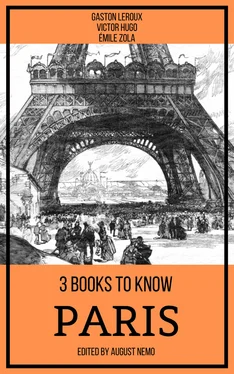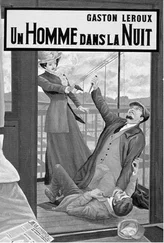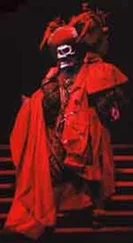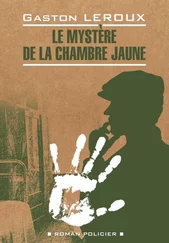In the middle of the hall, opposite the great door, a platform of gold brocade, placed against the wall, a special entrance to which had been effected through a window in the corridor of the gold chamber, had been erected for the Flemish emissaries and the other great personages invited to the presentation of the mystery play.
It was upon the marble table that the mystery was to be enacted, as usual. It had been arranged for the purpose, early in the morning; its rich slabs of marble, all scratched by the heels of law clerks, supported a cage of carpenter’s work of considerable height, the upper surface of which, within view of the whole hall, was to serve as the theatre, and whose interior, masked by tapestries, was to take the place of dressing-rooms for the personages of the piece. A ladder, naively placed on the outside, was to serve as means of communication between the dressing-room and the stage, and lend its rude rungs to entrances as well as to exits. There was no personage, however unexpected, no sudden change, no theatrical effect, which was not obliged to mount that ladder. Innocent and venerable infancy of art and contrivances!
Four of the bailiff of the palace’s sergeants, perfunctory guardians of all the pleasures of the people, on days of festival as well as on days of execution, stood at the four corners of the marble table.
The piece was only to begin with the twelfth stroke of the great palace clock sounding midday. It was very late, no doubt, for a theatrical representation, but they had been obliged to fix the hour to suit the convenience of the ambassadors.
Now, this whole multitude had been waiting since morning. A goodly number of curious, good people had been shivering since daybreak before the grand staircase of the palace; some even affirmed that they had passed the night across the threshold of the great door, in order to make sure that they should be the first to pass in. The crowd grew more dense every moment, and, like water, which rises above its normal level, began to mount along the walls, to swell around the pillars, to spread out on the entablatures, on the cornices, on the window-sills, on all the salient points of the architecture, on all the reliefs of the sculpture. Hence, discomfort, impatience, weariness, the liberty of a day of cynicism and folly, the quarrels which break forth for all sorts of causes—a pointed elbow, an iron-shod shoe, the fatigue of long waiting—had already, long before the hour appointed for the arrival of the ambassadors, imparted a harsh and bitter accent to the clamor of these people who were shut in, fitted into each other, pressed, trampled upon, stifled. Nothing was to be heard but imprecations on the Flemish, the provost of the merchants, the Cardinal de Bourbon, the bailiff of the courts, Madame Marguerite of Austria, the sergeants with their rods, the cold, the heat, the bad weather, the Bishop of Paris, the Pope of the Fools, the pillars, the statues, that closed door, that open window; all to the vast amusement of a band of scholars and lackeys scattered through the mass, who mingled with all this discontent their teasing remarks, and their malicious suggestions, and pricked the general bad temper with a pin, so to speak.
Among the rest there was a group of those merry imps, who, after smashing the glass in a window, had seated themselves hardily on the entablature, and from that point despatched their gaze and their railleries both within and without, upon the throng in the hall, and the throng upon the Place. It was easy to see, from their parodied gestures, their ringing laughter, the bantering appeals which they exchanged with their comrades, from one end of the hall to the other, that these young clerks did not share the weariness and fatigue of the rest of the spectators, and that they understood very well the art of extracting, for their own private diversion from that which they had under their eyes, a spectacle which made them await the other with patience.
“Upon my soul, so it’s you, ‘Joannes Frollo de Molendino!’” cried one of them, to a sort of little, light-haired imp, with a well-favored and malign countenance, clinging to the acanthus leaves of a capital; “you are well named John of the Mill, for your two arms and your two legs have the air of four wings fluttering on the breeze. How long have you been here?”
“By the mercy of the devil,” retorted Joannes Frollo, “these four hours and more; and I hope that they will be reckoned to my credit in purgatory. I heard the eight singers of the King of Sicily intone the first verse of seven o’clock mass in the Sainte-Chapelle.”
“Fine singers!” replied the other, “with voices even more pointed than their caps! Before founding a mass for Monsieur Saint John, the king should have inquired whether Monsieur Saint John likes Latin droned out in a Provençal accent.”
“He did it for the sake of employing those accursed singers of the King of Sicily!” cried an old woman sharply from among the crowd beneath the window. “I just put it to you! A thousand livres parisi for a mass! and out of the tax on sea fish in the markets of Paris, to boot!”
“Peace, old crone,” said a tall, grave person, stopping up his nose on the side towards the fishwife; “a mass had to be founded. Would you wish the king to fall ill again?”
“Bravely spoken, Sire Gilles Lecornu, master furrier of king’s robes!” cried the little student, clinging to the capital.
A shout of laughter from all the students greeted the unlucky name of the poor furrier of the king’s robes.
“Lecornu! Gilles Lecornu!” said some.
“Cornutus et hirsutus, horned and hairy,” another went on.
“He! of course,” continued the small imp on the capital, “What are they laughing at? An honorable man is Gilles Lecornu, brother of Master Jehan Lecornu, provost of the king’s house, son of Master Mahiet Lecornu, first porter of the Bois de Vincennes,—all bourgeois of Paris, all married, from father to son.”
The gayety redoubled. The big furrier, without uttering a word in reply, tried to escape all the eyes riveted upon him from all sides; but he perspired and panted in vain; like a wedge entering the wood, his efforts served only to bury still more deeply in the shoulders of his neighbors, his large, apoplectic face, purple with spite and rage.
At length one of these, as fat, short, and venerable as himself, came to his rescue.
“Abomination! scholars addressing a bourgeois in that fashion in my day would have been flogged with a fagot, which would have afterwards been used to burn them.”
The whole band burst into laughter.
“Holà hé! who is scolding so? Who is that screech owl of evil fortune?”
“Hold, I know him” said one of them; “‘tis Master Andry Musnier.”
“Because he is one of the four sworn booksellers of the university!” said the other.
“Everything goes by fours in that shop,” cried a third; “the four nations, the four faculties, the four feasts, the four procurators, the four electors, the four booksellers.”
“Well,” began Jean Frollo once more, “we must play the devil with them.” *
* Faire le diable a quatre.
“Musnier, we’ll burn your books.”
“Musnier, we’ll beat your lackeys.”
“Musnier, we’ll kiss your wife.”
“That fine, big Mademoiselle Oudarde.”
“Who is as fresh and as gay as though she were a widow.”
“Devil take you!” growled Master Andry Musnier.
“Master Andry,” pursued Jean Jehan, still clinging to his capital, “hold your tongue, or I’ll drop on your head!”
Master Andry raised his eyes, seemed to measure in an instant the height of the pillar, the weight of the scamp, mentally multiplied that weight by the square of the velocity and remained silent.
Читать дальше









